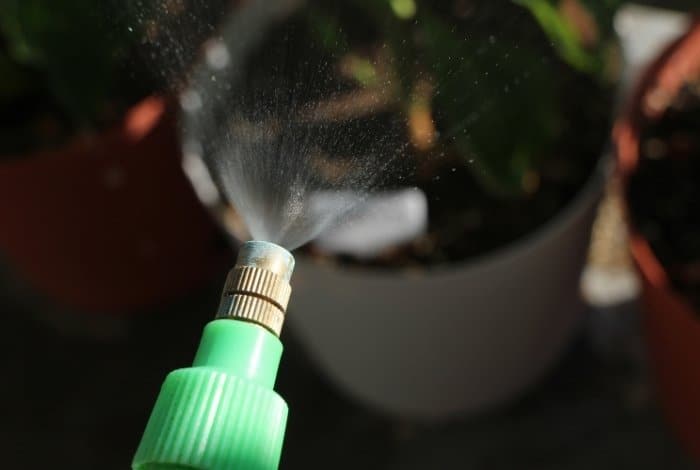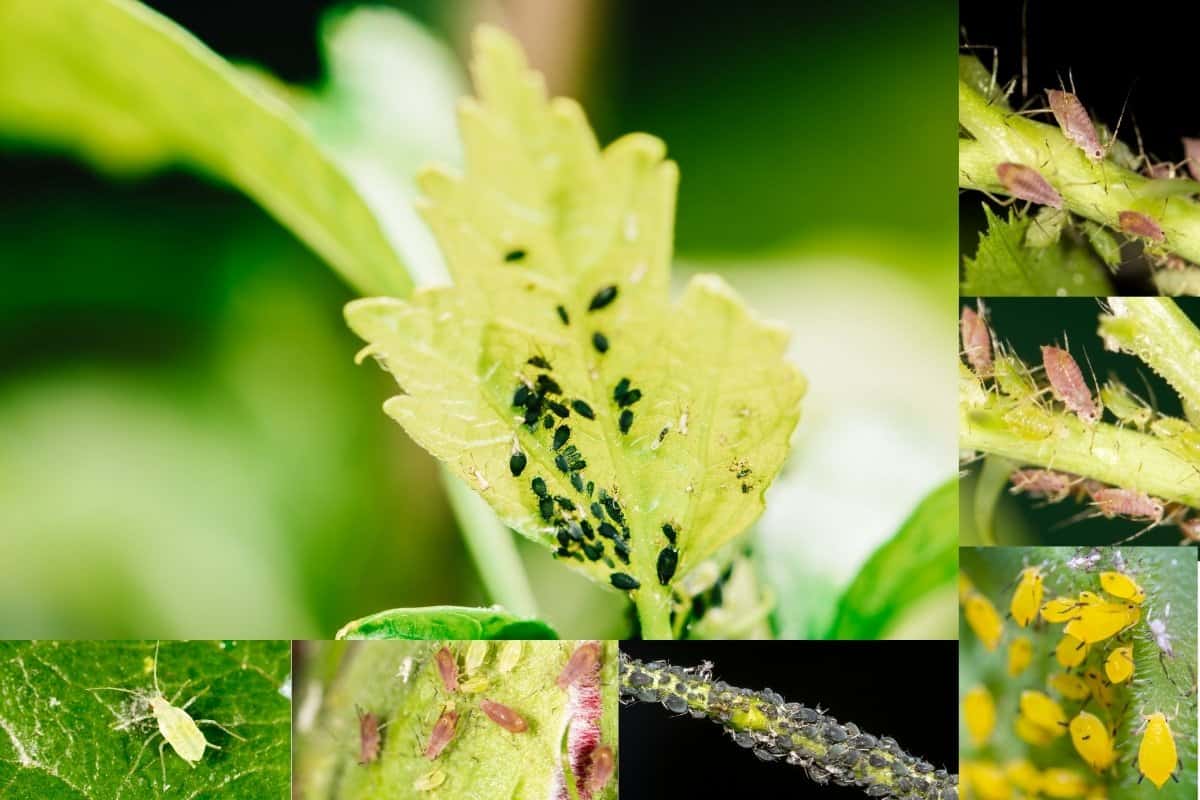Last Updated on January 19, 2022 by Tony Manhart
Are aphids contending with your plant growth? Discover how to get rid of aphids successfully. Aphids can be pretty problematic and cause a lot of damages to your growing plants. They feed on your plant leaving them exposed to disease and cause stunted growth, yellowing of leaves, and coiling of leaves.
Aphids can also attract other pests to your garden. They secret a sugary substance as they suck on your plants. This sugary substance attracts ants thereby giving you ants problems.
Tips on How to Get Rid of Aphids on Plants
Aphids are so tiny that you might not notice them. So the first thing you want to do is to identify and be sure you have aphid infestation and it’s not just a disease. After identification, you can now proceed to treatment.
Let’s talk about some of the things you can do to get rid of aphids.
Getting Rid of Aphids: Natural Method
- Essential Oils: One easy and safest method of eliminating aphids is with the use of essential oils like peppermint, clove, rosemary, and thyme. Essential oils for aphids are natural organic sprays and they are environmentally safe for your plants and beneficial insects. Use up to 5 drops of oils and mix in water, spray the oil mixture on the infested plants. This will focus on adult aphids, larvae, and eggs.
- Water Mixed with Soap: you can make some natural aphid spray with some liquid soap mixed with water. Spray the affected areas. Always apply every 2 to 3 days for 14 days straight. The soap water will eliminate aphids without affecting beneficial insects.
Side Note: Some soap can be bad for your plant. Always choose the purest form. You can test a small portion when applying soap and water and monitor the plant for a couple of days. If there are no side effects on your plant you can proceed to apply soap and water on the rest of the aphid infested plants.

- Stream of Water: you can also knock off aphid from your plants with a strong stream of a water hose. You will need to repeat this process every 2-3 days for at least two weeks for successful elimination.
- Predators: invite and encourage predators to naturally eliminate aphids. These predators will feed on aphids and their larvae. Examples of these predators are ladybugs, parasitic wasp, beetle, and birds.
- Growing Beneficial Plants: you can grow some plants that will repel aphids, e.g. catnip, garlic, and onions. You can also grow some plant varieties that will attract beneficial insects that will feed on these aphids. e.g. clover, fennel, mint, and yarrow.
Organic Laboratories Nature-safe insecticide
Chemical Method- Aphid Control
If you have a serious aphid infestation, you can go for some pesticides. But make sure you have tried all the natural methods. Pesticides may harm some beneficial predatory insects and pollination bees. You can go with systematic pesticides.
Final Note
After a successful elimination of aphids, you want to take some preventive measures to make sure they never return. So here are some preventive measures:
- Always encourage beneficial insects and predatory birds.
- Always take a close look at your plant and apply some essential oils if you notice any aphid eggs.
- Grow more beneficial plants.
FAQs
How do I make a natural aphid spray?
To make an aphid spray, all you need to do is mix 1 tablespoon of liquid soap and 2 tablespoons of boiling water. Then, stir in 1 teaspoon of baking soda and 2 teaspoons of white vinegar.
You can also use a larger spray bottle with a top that clips to the top. Just pour the mixture into your bottle and close the lid.
Will vinegar and water kill aphids?
Vinegar, a common household item, is often used to get rid of aphids. Many people use it in order to kill and remove them.
A major problem with vinegar is that it can actually kill the plant it is being sprayed on as well. This isn't a problem from a human's perspective because they can just add more plants in the yard to replace any dying ones, but gardeners might not be able to replant their plants if they use vinegar as an insecticide for any other reason than just killing the pests.
Do banana peels keep aphids away?
Banana peels serve as an effective deterrent for aphids. However, there are some caveats when it comes to their effectiveness. First, the peel should remain intact and not be broken into pieces because it becomes brittle after being peeled and will eventually break off from the fruit. Second, it has been found that peels will not prevent infestations of aphids in orchards where they have been planted nearby as they spread easily through stems and leaves and onto the fruit itself.
What kills aphids instantly?
Aphids are known to be a nuisance in gardens and crops. They can cause significant damage to plants, especially if they are not killed immediately.
The key to killing aphids instantly is twofold: finding them and attacking them first. If you find one of these pests, then you should try to attack it with a solution that targets the insect’s bodies. Some solutions include washing your plants with soap, using insecticidal soaps or spraying your plants with horticultural oils.
What causes aphid infestation?
Aphid infestation is the presence of aphids. They are small insects that feed on the sap of plants. Their ability to reproduce quickly makes them a threat to many plants, especially in warm and moist environments.
Aphid infestation is caused by a variety of factors, including stress from water loss, drought and the spread of lawns and other lawn plants. Just like ants, they can also be spread by ants moving their eggs or adults into new areas in search for food sources.
An Aphid Infestation causes damage to plant stems as they feed on sap and leaves on the plant leaves to survive or provide a place for their eggs.
Do aphids like basil?
Aphids are a type of small insect that feeds on plants. They are typically found in large groups, with each insect attaching itself to a single plant.
Aphids are commonly found on basil plants and feed off the plant to get the energy they need.
What deters aphids?
Many insects are predators of aphids. Most plants do not like aphids because they sap the plant’s nutrients. Aphid predators help keep the population of aphids in check by feeding on the aphids, causing a decrease in their population.
The main predator is ladybugs that eat and kill the entire colony of aphids. Ladybugs are small insects that have a round shape with dark spots on it and red eyes. Ladybug eggs are usually laid on leaves or stems where they hatch into larvae which then feed on the aphid eggs, one by one, until they are all gone.
Ladybugs can also be preyed upon by many other predators like parasitic wasps, praying mantis, lacewings and green lacewings as well as vertebrate predators like frogs.

Eunice is a gardener who loves to play in the dirt. She starts her day early in the morning, watering her plants and tending to her garden. She loves the smell of freshly cut grass and the feeling of sunshine on her back as she works. She‘s a master at creating beautiful flower arrangements and can often be found humming a tune as she tends to her plants. When she‘s not gardening, she loves to read books about nature and share her knowledge with others. Eunice loves gardening so much that she‘s even been known to talk to her plants!



